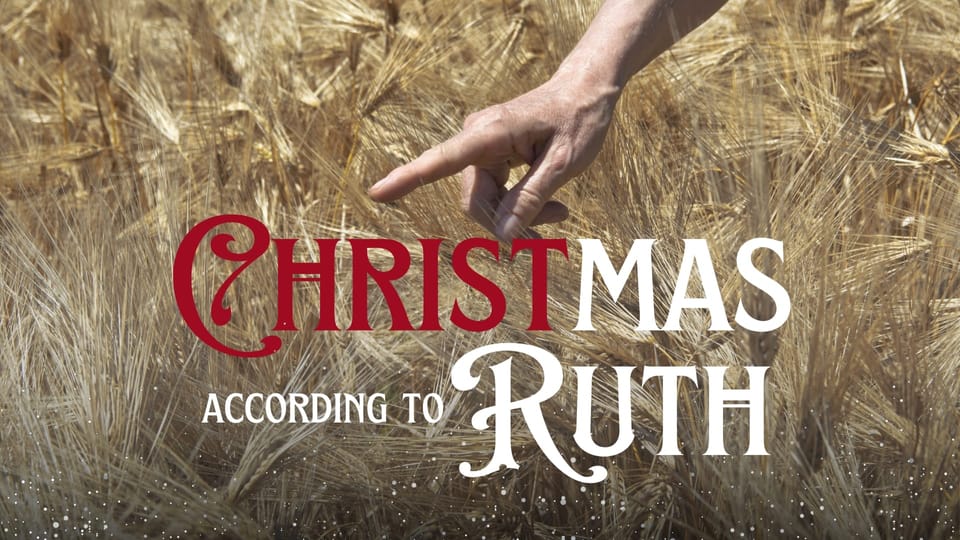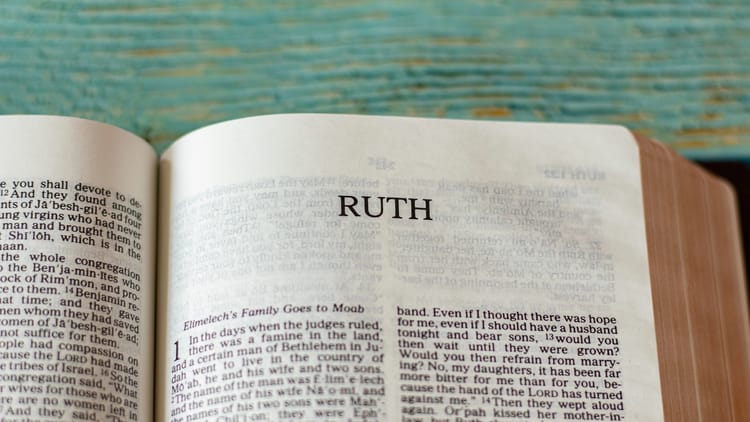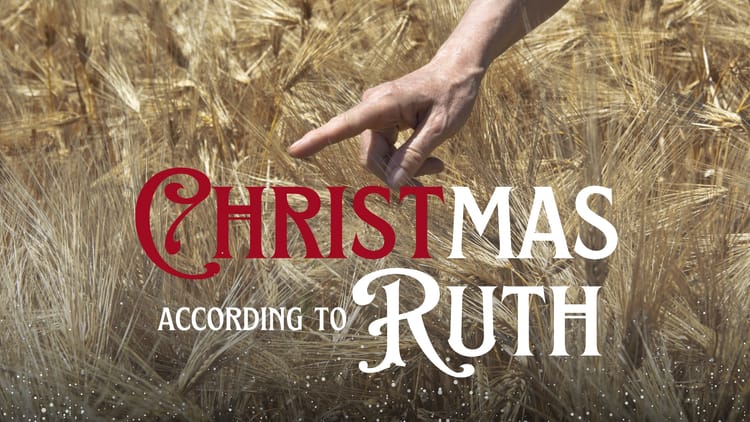Echoes of Jesus (Ruth 4)

Big Idea: God works through seemingly impossible circumstances and sacrificial love to bring redemption through a baby who is born in Bethlehem.
On the morning of September 20, 1931, three English professors in their 30s walked along Addison’s Walk at Magdalen College, Oxford. You’ve probably heard the name of two of them: 32-year-old C. S. Lewis, who later wrote The Chronicles of Narnia, was friends with 39-year-old J.R.R. Tolkien, who later wrote The Lord of the Rings.
On the walk, they talked about love and friendship. Lewis believed that religious stories like Christmas were human inventions, similar to pagan myths.
Tolkien helped him see things completely differently. All other stories reveal longings that are fulfilled in the true story of Jesus. These stories were "good dreams" sent by God to prepare humanity for the true story of Christ. The Gospel fulfills the deep longings expressed in all these other stories. All other stories point toward and find their ultimate meaning in Christ's story. Jesus's story is the actual object, while other stories are mere reflections in mirrors. Similar themes appear in stories from different cultures and times because they all reflect the ultimate truth found in Christ.
On September 28, 1931, just eight days after discussing Christ as the true myth with Tolkien, Lewis fully embraced Christ's divinity.
Hear the key insight that changed the life of C.S. Lewis: every great story points to a deeper, more significant story. Themes like sacrifice, renewal, and love overcoming death recur because they reflect the greatest story ever told: the true story of Jesus. His story isn't just another beautiful myth; it's the historical reality that all other stories point toward.
This is exactly what we discover in the book of Ruth.
Ruth’s Story
For the past few weeks, we’ve been looking at the story of Ruth in the Bible. It’s an amazing story.
During a difficult time in Israel's history, Naomi lost her husband and two sons while living in Moab during a famine. When she decided to return to her homeland of Bethlehem, one of her widowed daughters-in-law, Ruth, refused to leave her side, famously declaring “Where you go, I will go; your people will be my people, and your God my God.”
Upon arriving in Bethlehem, Ruth showed incredible initiative by gleaning leftover grain in the fields to support herself and Naomi, catching the attention of a wealthy landowner named Boaz, who just happened to be a relative of Naomi's late husband. Impressed by Ruth's devotion to Naomi and her strong character, Boaz began secretly protecting her and ensuring she had plenty to gather. Following Naomi's clever matchmaking scheme, Ruth made a bold midnight visit to the threshing floor where Boaz slept, essentially proposing marriage by asking him to “spread his cloak” over her — a cultural symbol for marriage and protection — leading to where we are in the story as we look at Ruth 4.
This is an incredible story! It’s a story that relates to Christmas in a few ways. It happens in Bethlehem, and it all hinges on a baby who will be born who changes everything. But that’s not all. It’s also a story that echoes the greatest story ever told.
Three Echoes of a Better Story
In Ruth 4, we come to the end of this amazing story. Even better, we see how this story points to the story of Christmas in three ways. The gospel shows up over and over in this chapter in ways that show us what Jesus did at Christmas. We find three echoes of a better story in the story of Ruth.
First:
Ruth’s story is an echo of how God overcomes the obstacles that stand in the way of our redemption (4:1-6).
Last week, we ended on a bit of a cliffhanger. Ruth proposed to Boaz, and he agreed to marry and redeem her. But there's a wrinkle. In chapter 3:12-13, he said:
And now it is true that I am a redeemer. Yet there is a redeemer nearer than I. Remain tonight, and in the morning, if he will redeem you, good; let him do it. But if he is not willing to redeem you, then, as the LORD lives, I will redeem you.
We're left wondering, what's going to happen? Will this man come through and redeem her? If so, what will he be like? What happens to Boaz, who seems to be God's answer to her needs?
In the first six verses of chapter four, we find the answer. In the morning, Boaz went to the gate and met this close relative. In the presence of the elders, he told him about the opportunity to buy back the land that belonged to their relative. The man agreed to redeem it. But then Boaz added an extra detail: the land came with Ruth the Moabite, the widow. He would have to perpetuate the name of her dead husband in the inheritance. That was too much for him. The redeemer said he didn't want to proceed with it. In verse 6, he said, “I cannot redeem it for myself, lest I impair my own inheritance. Take my right of redemption yourself, for I cannot redeem it.” This possible redeemer has his own interests at heart, not the interests of Ruth.
You can feel the tension. What if this man had chosen to redeem Ruth? It would have ruined everything! This seems like a small detail, and yet it’s actually what provides so much of the suspense in the book of Ruth. Everything was at stake. Everything was at risk of completely falling apart.
And so it is with Christmas.
We’re taking a break from preaching through the book of Revelation right now. We’re going to get to this in a few months, but Revelation 12 contains a version of the Christmas story. A woman — representing the people of God — gives birth to “one who is to rule all the nations with a rod of iron,” meaning Jesus (Revelation 12:5). But “a great red dragon, with seven heads and ten horns, and on his heads seven diadems” — representing Satan — stood before the woman as she gave birth trying to devour it.
As I say, we’re going to get to this, but for now, just realize that even though we sing “Silent Night, Holy Night,” in one sense, it was anything but that. All hell was at war trying to destroy the Messiah and God’s people. From Genesis 3 on, Satan has opposed everything to do with your salvation over and over again. But God has overcome every obstacle standing in the way of the birth of the Messiah and your salvation. Satan has tried everything he can to foil the unfolding of God’s plan, but God has no equal. Just as God saw to it that Ruth was redeemed by Boaz, God will see to it that his people are redeemed despite all obstacles.
God will overcome every obstacle that stands in order to save us. He did this with Ruth, and he has done this with Jesus.
But that’s not all.
Ruth’s story is an echo of Jesus’ sacrificial love (4:7-12).
In verses 7 to 12, Boaz demonstrates his love by choosing to redeem Ruth. The closer relative, who could have been a redeemer, didn’t act as redeemer because he wanted to protect his interests. In contrast, Boaz isn’t concerned about protecting his interests. He gives himself selflessly to redeem Ruth. He attested to his intentions using the customs of the day, witnessed by the elders at the gate. He gave himself selflessly to redeem someone who had no options, a Moabite, not out of self-interest but out of love.
And it resulted in blessing. The elders pronounce a threefold blessing on Ruth:
We are witnesses. May the LORD make the woman, who is coming into your house, like Rachel and Leah, who together built up the house of Israel. May you act worthily in Ephrathah and be renowned in Bethlehem, and may your house be like the house of Perez, whom Tamar bore to Judah, because of the offspring that the LORD will give you by this young woman. (Ruth 4:11-12)
Three blessings: two that bless this Moabite woman with fertility so she could play a role in the establishment of a significant family line in Israel; a line that would contribute to the tribe from which the Messiah would come. Remember: Ruth was a foreigner. She’d been married for years before. Against the odds, even as an outsider, they wanted her to play a role in the story of Israel, a story that would lead to the coming of the Messiah.
But not only that, they also prayed that Boaz’s name would be renowned.
God gave this blessing. “So Boaz took Ruth, and she became his wife. And he went in to her, and the LORD gave her conception, and she bore a son” (Ruth 4:13). A baby is placed on Naomi’s lap. She’s one from emptiness to fulfillment. This baby changes everything.
How did all of this happen? By God’s design, but also through self-sacrificial love. Self-sacrificial love brings outsiders and makes them insiders. Self-sacrificial love acts not out of self-interest but for the interest of others. Self-sacrificial love ends up blessing us with a blessing we could never have gotten on our own.
And that’s just how Jesus loved us. At Christmas, Jesus demonstrated self-sacrificial love through the incarnation by voluntarily leaving his heavenly glory, willingly subjecting himself to human limitations and weakness. He subjected himself to human frailties like hunger, thirst, and fatigue. He lived among sinful humanity. Why did he do this? He came with a purpose: he came not to serve, but to serve and give himself a life of ransom for many (Mark 10:45). And he did it all so we could be blessed. We have been saved by love.
Ruth’s story shows us that God will overcome every obstacle that stands in the way of our salvation. But it also shows us what love looks like. The same kind of love and redemption that Ruth experienced is the love that is available to anyone who puts their hope in Jesus.
God works through seemingly impossible circumstances and through sacrificial love. But there’s one more way that Ruth’s story echoes the gospel.
Ruth’s story is an echo of the baby born in Bethlehem who changed everything (4:13-22).
Verse 17 says, “They named him Obed. He was the father of Jesse, the father of David.” The original readers would have gasped. David! The greatest king of Israel. This is such an important detail that verses 18 to 22 give the family tree that leads to David.
In the worst of times, a baby was born who changed everything, who led to the greatest king of Israel, one who would unite and establish the kingdom, the one to whom God would promise to establish his throne forever. This baby born to Ruth changed everything.
But that’s not all.
Matthew 1:7 mentions Ruth as part of Jesus’ family tree. She’s one of only five women who appear in Jesus’ family tree, most of them outsiders. This Moabite (non-Jewish) woman became part of the Messianic line. In the very town where Ruth had a baby, Mary had a baby who changed the world. God used Ruth, a foreigner who chose to follow him, as a vital link in bringing forth the Messiah through the royal line of David.
Ruth is a great love story. But it points to the even greater love story of Scripture, the epic story of God who will save his people. Behind the scenes, God is working out his providential plan to bring King David to his throne, and to eventually his own Son, King Jesus, to save us.
The story of Ruth is amazing, but it’s just an echo of a greater story of a God who will stop at nothing to save us; a God who saves us through self-sacrificial love; a God who sends a baby to be born who changes you, who changes everything.
God works through seemingly impossible circumstances and sacrificial love to bring redemption through a baby who is born in Bethlehem.





